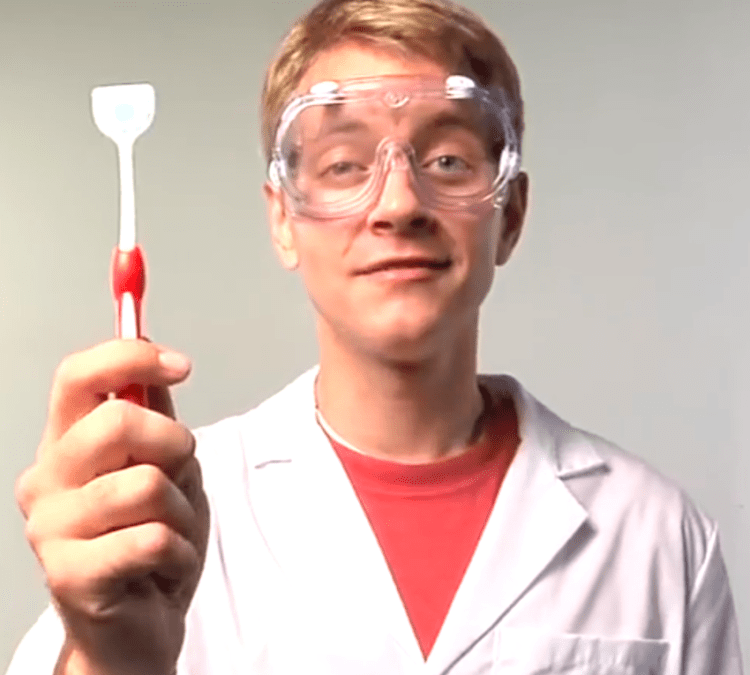A new Salt Lake City-based company called Molio is today launching what it says is a new approach to video marketing, backed by $3 million in investment.
To understand its perspective, let’s first wind back to the invention of a tongue cleaner. It is, according to Molio CEO Jeff Davis, “the first consumer product to be commercialized on a global level just using YouTube videos.”
In the early 2000s, Robert Wagstaff — called “Dr. Bob,” as he’s a biochemist with a Ph.D. — invented the Orabrush tongue brush to help people fight bad breath. Bacteria on the tongue is a key factor in bad breath, and Orabrush scapes the stuff off.
For a decade, he tried to market it through traditional channels from his base in Salt Lake City, without much luck. In 2009, he met up with two college students, Neal and Jeff Harmon.
They introduced him to YouTube and created an initial video promoting Orabrush:
Over time, they and others in a growing team tried more than 150 different videos to promote the tongue brush — including the series, “Diary of a Dirty Tongue.” (See below.) The variations allowed them to test price-points and experiment with targeting to different audience segments.
Now, 44 million views later, Orabrush has become one of the biggest commercial hits on YouTube. It’s a multimillion dollar brand that’s on sale in more than two dozen countries.
Davis told VentureBeat that Orabrush has received more views on YouTube than such mega-consumer product brands as Colgate or Johnson & Johnson.
Orabrush helped spawn the Orapup tongue cleaner for the canine set, since dogs are notorious for their bad breath. (Which is not surprising, if you take into account the stuff they eat.) With this approach — testing and targeting 56 different video variations and 46 different price-points — Orapup similarly became a multimillion brand.
Now, the team that video marketed Orabrush/Orapup — and the software that they developed for handling the variations and the targeting — is spinning off as Molio.
“At Orabrush, we developed three unique offerings,” Davis said. He was also an angel investor in Orabrush and has been an exec at Proctor & Gamble.
There’s “an oral care product line for humans, another for dogs, and a video ad technology and media company.”
VentureBeat is studying marketing clouds.
Answer our survey now and we’ll share the results with you.
Molio intends to build on the Orabrush model, which it describes as “reverse marketing.”
“Traditional models start with an idea/concept, build a prototype, run expensive market research, and, once success criteria is met, the product is sold into retail and then marketing kicks in to create demand,” he said.
Instead, Molio intends to begin with many versions of video-marketing clips, test different marketing approaches and price-points, solidify the most successful model, and then roll it out.
It is, essentially, an updated version of the classic Internet marketing model: ready, fire, aim.
To do that at scale, Molio’s platform analyzes viewer data from YouTube and other sources, optimizes video clip variations to test different calls to action for specific audience segments, tracks the testing, and provides automated bidding tools for placing preroll, postroll, and in-stream video ads in YouTube and elsewhere.
In the works, Davis said, is the capability to automatically generate video clip variations, based on feedback. “It could remove the need for human oversight in some cases,” he added.
As for competitors, he noted that there are “a handful of [product marketing] companies that play in the YouTube landscape,” each with a unique focus or niche.
On the other hand, Davis said, Molio brings “it all together in a cohesive service and platform that gives our clients a one-stop go-to for their video marketing needs.” Molio currently has 10 clients on the platform from its now-completed beta period, including Wilson Golf’s line of Duo golf balls and Strider bikes.
The new Series A funding will be used to hire software engineers, key creative personnel, and account planners, and to buy some hardware. The round came from Greycroft Partners, with participation from True Ventures, Subtraction Capital, Advancit Capital, and Peak Ventures.
As for Dr. Bob, Davis told us the 80-year-old inventor is busy developing another — as yet unannounced — product.
VentureBeat's mission is to be a digital town square for technical decision-makers to gain knowledge about transformative enterprise technology and transact. Learn More

